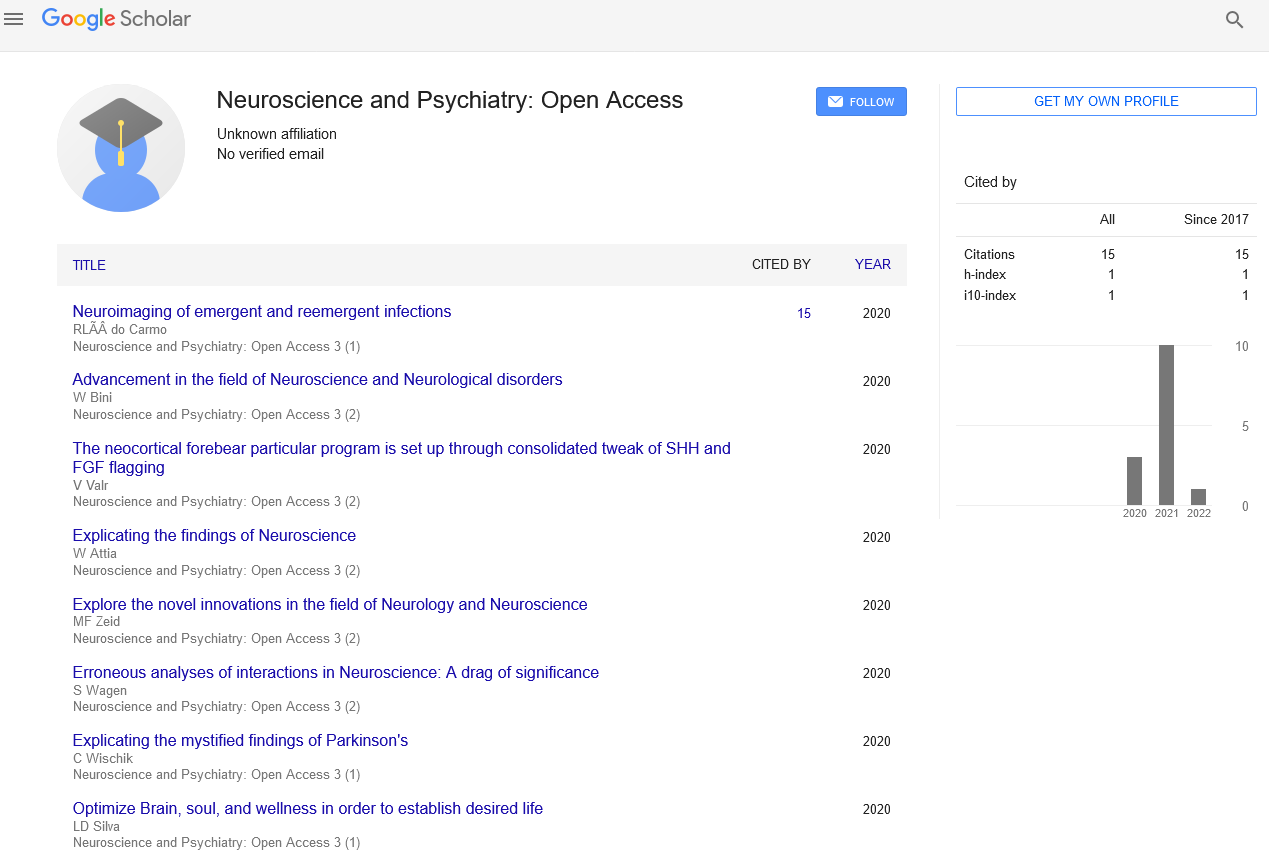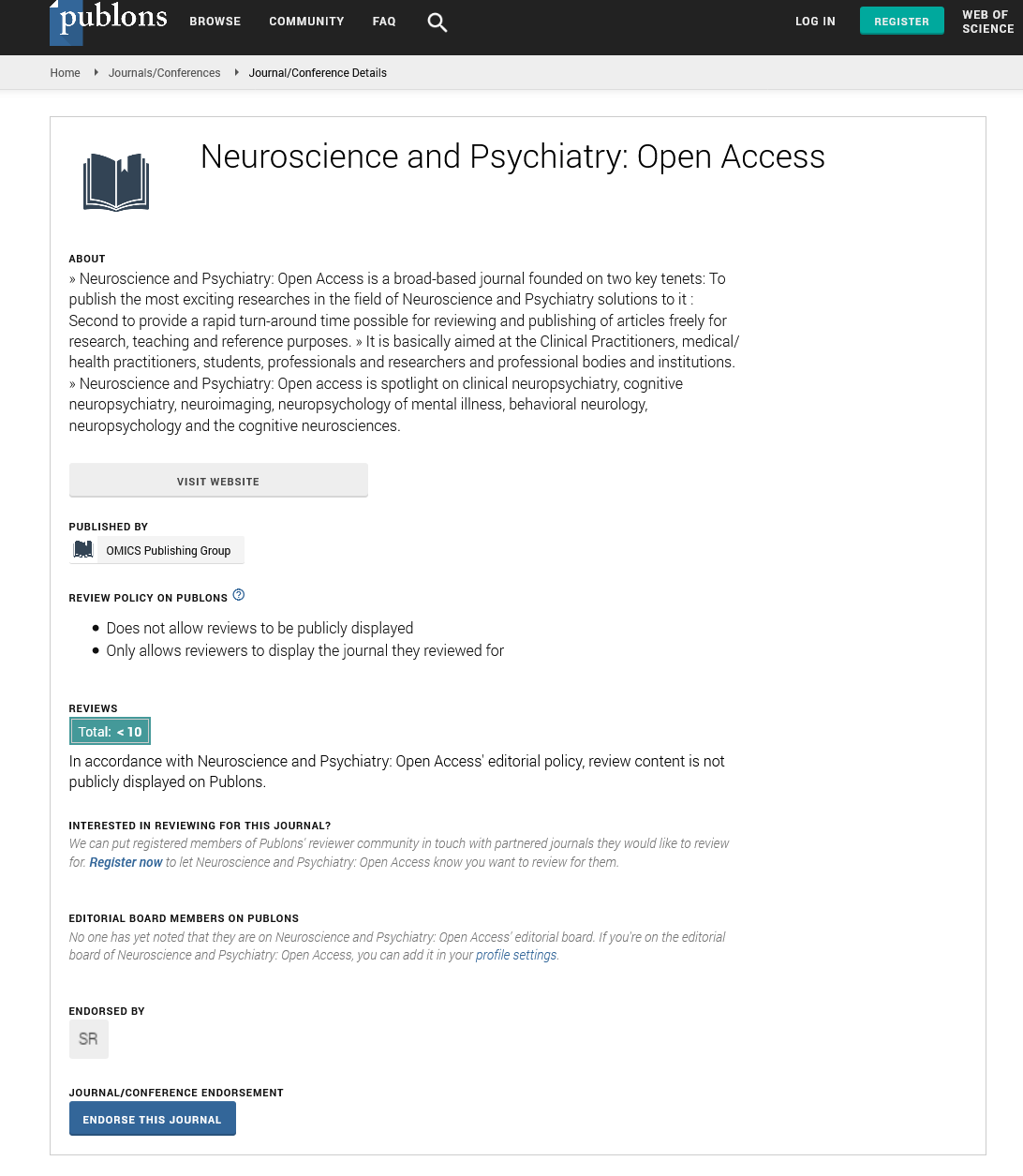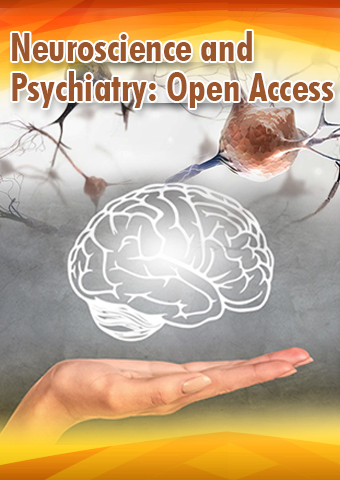Perspective - Neuroscience and Psychiatry: Open Access (2023) Volume 6, Issue 5
Navigating the Complex Landscape of Psychiatry: From Stigma to Healing
- Corresponding Author:
- Vaiphei
Department of Neuroscience and Psychiatry, JNTU H University, Telangana, India
E-mail: vaiph@gmail.com
Received: 28-08-2023, Manuscript No. NPOA-23-119205; Editor assigned: 30-08-2023, PreQC No. NPOA-23-119205 (PQ); Reviewed: 13-09-2023, QC No. NPOA-23-119205; Revised: 20-09-2023, Manuscript No. NPOA-23-119205 (R); Published: 03-10-2023, DOI: 10.47532/npoa.2023.6(5).121-123
Introduction
Psychiatry is a field of medicine dedicated to understanding and treating mental health disorders. It has made remarkable progress over the years, dispelling myths and challenging stigmas associated with mental illnesses. This article delves into the world of psychiatry, exploring its evolution, the diverse range of mental health disorders it addresses, and the holistic approach it takes towards healing and wellness.
The roots of psychiatry can be traced back to ancient civilizations, where mental health disorders were often attributed to supernatural forces or considered as moral failings. It was only during the 19th and 20th centuries that psychiatry emerged as a distinct medical discipline with a scientific approach to understanding and treating mental disorders.
Prominent figures like Emil Kraepelin and Sigmund Freud played significant roles in shaping the field. Kraepelin’s work in categorizing mental disorders laid the foundation for modern psychiatric classification systems, while Freud’s psychoanalytic theory introduced the concept of the unconscious mind and the importance of psychological factors in mental health.
The field of psychiatry has continued to evolve, with advancements in neuroscience, pharmacology, and psychotherapy contributing to a more comprehensive understanding of mental disorders and the development of effective treatments.
Description
Categorizing mental disorders
Psychiatry employs a diagnostic system to categorize mental health disorders, with the Diagnostic and Statistical Manual of Mental Disorders (DSM) being the most widely recognized classification. The DSM provides a standardized framework for diagnosing and treating mental illnesses, including mood disorders, anxiety disorders, psychotic disorders, and many others.
Understanding and categorizing mental disorders is critical for providing appropriate treatment and support to those in need. It allows mental health professionals to identify the specific symptoms and underlying causes of each disorder and tailor interventions accordingly.
The range of mental health disorders
Mental health disorders are diverse, spanning a wide spectrum of conditions. Let’s explore some of the most prevalent ones:
Mood disorders: Mood disorders, such as depression and bipolar disorder, are characterized by disturbances in a person’s emotional state. Depression often involves persistent feelings of sadness, hopelessness, and disinterest, while bipolar disorder presents with episodes of mania (elevated mood) and depression.
Anxiety disorders: Anxiety disorders, including generalized anxiety disorder, panic disorder, and social anxiety disorder, are characterized by excessive fear and worry. These conditions can significantly impact an individual’s daily life.
Schizophrenia: Schizophrenia is a complex disorder that affects a person’s thinking, perception, and behavior. It often involves delusions, hallucinations, and disorganized thoughts.
Personality disorders: Personality disorders, like borderline personality disorder and antisocial personality disorder, affect how a person perceives and relates to the world. They often result in dysfunctional patterns of behavior and relationships.
Eating disorders: Eating disorders, such as anorexia nervosa and bulimia nervosa, involve unhealthy relationships with food and body image, leading to severe physical and psychological consequences.
Obsessive-compulsive and related disorders: Conditions like Obsessive-Compulsive Disorder (OCD) involve distressing obsessions and compulsions that can interfere with daily life.
The holistic approach in psychiatry
Psychiatry embraces a holistic approach to mental health, considering the biological, psychological, and social aspects of an individual’s life. This approach is essential for a comprehensive understanding of mental health disorders and the development of effective treatment plans.
Biological factors: Biological factors encompass the genetic, neurobiological, and biochemical components that influence mental health. Advances in neuroscience have shed light on the role of neurotransmitters and brain structures in various disorders. Medications, such as antidepressants and antipsychotics, target these biological factors to manage symptoms.
Psychological factors: Psychological factors delve into an individual’s thoughts, emotions, and behaviors. Psychotherapy, also known as talk therapy, is a vital component of psychiatric treatment. Therapists use various approaches, including Cognitive-Behavioral Therapy (CBT), psychoanalysis, and Dialectical Behavior Therapy (DBT), to help individuals understand and manage their psychological issues.
Social factors: Social factors consider the impact of an individual’s environment, relationships, and life circumstances on their mental health. Social support, family dynamics, socioeconomic status, and cultural influences all play significant roles. Psychiatry aims to address these social factors through therapy, education, and community resources.
Cognitive-Behavioral Therapy (CBT): CBT helps individuals identify and challenge negative thought patterns and behaviors. It is effective for various disorders, including anxiety, depression, and PTSD.
Psychodynamic therapy: This approach explores the influence of unconscious thoughts and early life experiences on current behavior and relationships.
Dialectical Behavior Therapy (DBT): DBT focuses on emotional regulation, interpersonal effectiveness, and distress tolerance. It is particularly useful for individuals with borderline personality disorder.
Family therapy: Family therapy involves working with families to improve communication and resolve conflicts. It can be valuable when a person’s mental health issues affect the family dynamic.
Group therapy: Group therapy provides individuals with a supportive peer environment in which they can share their experiences and learn from others.
Emerging approaches and therapies
Psychiatry continues to evolve, with new approaches and therapies continually emerging. Some of the exciting developments include:
Telepsychiatry: Telepsychiatry leverages technology to provide mental health services remotely. It has become increasingly important, especially in the context of the COVID-19 pandemic, making mental health care more accessible.
Integrative psychiatry: Integrative psychiatry incorporates complementary and alternative therapies, such as mindfulness, yoga, and nutritional approaches, alongside traditional psychiatric treatments to address the whole person.
Precision psychiatry: Precision psychiatry tailors treatment plans to an individual’s unique genetic and neurobiological makeup. It holds promise for more personalized and effective interventions.
Conclusion
Psychiatry is a dynamic field that continues to break down barriers and expand our understanding of mental health. By taking a holistic approach that considers biological, psychological, and social factors, psychiatry provides a comprehensive framework for diagnosing and treating mental health disorders. While stigma remains a formidable challenge, ongoing efforts in advocacy and education are gradually changing societal attitudes towards mental health. Medication, psychotherapy, and emerging therapies all contribute to a more nuanced and effective approach to psychiatric care.
As psychiatry evolves and our knowledge deepens, the field is poised to provide greater support, understanding, and healing to individuals and communities affected by mental health disorders. It is a field that recognizes the importance of the mind and the importance of compassionate care in the journey towards well-being.


